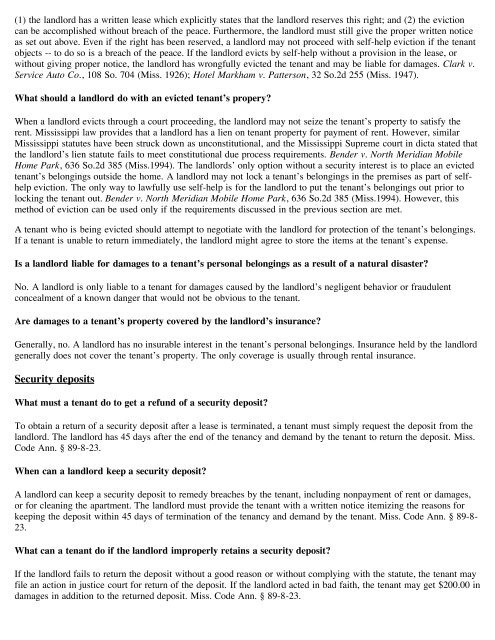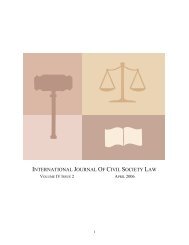Hurricane Katrina: Legal Issues - Columbus School of Law
Hurricane Katrina: Legal Issues - Columbus School of Law
Hurricane Katrina: Legal Issues - Columbus School of Law
You also want an ePaper? Increase the reach of your titles
YUMPU automatically turns print PDFs into web optimized ePapers that Google loves.
(1) the landlord has a written lease which explicitly states that the landlord reserves this right; and (2) the eviction<br />
can be accomplished without breach <strong>of</strong> the peace. Furthermore, the landlord must still give the proper written notice<br />
as set out above. Even if the right has been reserved, a landlord may not proceed with self-help eviction if the tenant<br />
objects -- to do so is a breach <strong>of</strong> the peace. If the landlord evicts by self-help without a provision in the lease, or<br />
without giving proper notice, the landlord has wrongfully evicted the tenant and may be liable for damages. Clark v.<br />
Service Auto Co., 108 So. 704 (Miss. 1926); Hotel Markham v. Patterson, 32 So.2d 255 (Miss. 1947).<br />
What should a landlord do with an evicted tenant’s propery?<br />
When a landlord evicts through a court proceeding, the landlord may not seize the tenant’s property to satisfy the<br />
rent. Mississippi law provides that a landlord has a lien on tenant property for payment <strong>of</strong> rent. However, similar<br />
Mississippi statutes have been struck down as unconstitutional, and the Mississippi Supreme court in dicta stated that<br />
the landlord’s lien statute fails to meet constitutional due process requirements. Bender v. North Meridian Mobile<br />
Home Park, 636 So.2d 385 (Miss.1994). The landlords’ only option without a security interest is to place an evicted<br />
tenant’s belongings outside the home. A landlord may not lock a tenant’s belongings in the premises as part <strong>of</strong> selfhelp<br />
eviction. The only way to lawfully use self-help is for the landlord to put the tenant’s belongings out prior to<br />
locking the tenant out. Bender v. North Meridian Mobile Home Park, 636 So.2d 385 (Miss.1994). However, this<br />
method <strong>of</strong> eviction can be used only if the requirements discussed in the previous section are met.<br />
A tenant who is being evicted should attempt to negotiate with the landlord for protection <strong>of</strong> the tenant’s belongings.<br />
If a tenant is unable to return immediately, the landlord might agree to store the items at the tenant’s expense.<br />
Is a landlord liable for damages to a tenant’s personal belongings as a result <strong>of</strong> a natural disaster?<br />
No. A landlord is only liable to a tenant for damages caused by the landlord’s negligent behavior or fraudulent<br />
concealment <strong>of</strong> a known danger that would not be obvious to the tenant.<br />
Are damages to a tenant’s property covered by the landlord’s insurance?<br />
Generally, no. A landlord has no insurable interest in the tenant’s personal belongings. Insurance held by the landlord<br />
generally does not cover the tenant’s property. The only coverage is usually through rental insurance.<br />
Security deposits<br />
What must a tenant do to get a refund <strong>of</strong> a security deposit?<br />
To obtain a return <strong>of</strong> a security deposit after a lease is terminated, a tenant must simply request the deposit from the<br />
landlord. The landlord has 45 days after the end <strong>of</strong> the tenancy and demand by the tenant to return the deposit. Miss.<br />
Code Ann. § 89-8-23.<br />
When can a landlord keep a security deposit?<br />
A landlord can keep a security deposit to remedy breaches by the tenant, including nonpayment <strong>of</strong> rent or damages,<br />
or for cleaning the apartment. The landlord must provide the tenant with a written notice itemizing the reasons for<br />
keeping the deposit within 45 days <strong>of</strong> termination <strong>of</strong> the tenancy and demand by the tenant. Miss. Code Ann. § 89-8-<br />
23.<br />
What can a tenant do if the landlord improperly retains a security deposit?<br />
If the landlord fails to return the deposit without a good reason or without complying with the statute, the tenant may<br />
file an action in justice court for return <strong>of</strong> the deposit. If the landlord acted in bad faith, the tenant may get $200.00 in<br />
damages in addition to the returned deposit. Miss. Code Ann. § 89-8-23.

















